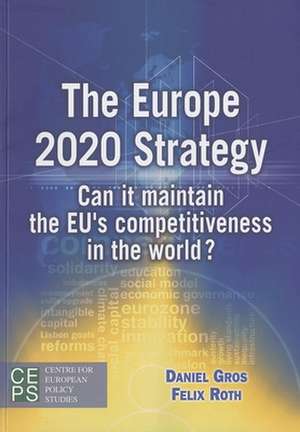The Europe 2020 Strategy: Can It Maintain the EU's Competitiveness in the World?
Autor Daniel Gros, Felix Rothen Limba Engleză Paperback – 9 apr 2014
Launched in March 2010 by the European Commission, the Europe 2020 strategy aims to achieve "smart, sustainable, and inclusive" growth. The engines for this growth are
• Knowledge and innovation
• Greener and more efficient use of resources
• Higher employment combined with social and territorial cohesion
This CEPS report takes an in-depth look at this major initiative and finds that the strategy itself needs to be revised in several important respects. First, the authors believe, R&D spending per se is not the best indicator of innovativeness; a new measure, intangible capital, would be more appropriate. Second, while increasing the share of the workforce with a university degree is important for competitiveness and employment, it is the quality of that education that matters more than the quantity. The study also finds that employment targets would be better reached by a skills upgrade among women who have the least education. Concerning climate change, the authors conclude that unless the EU increases the level of its ambition and adds a carbon import tariff, reduction targets for greenhouse gas emissions are likely to have a negligible impact on global climate change.
Finally and more generally, the report argues that the 2020 strategy should acknowledge the importance of institutional efficiency at the national level.
• Knowledge and innovation
• Greener and more efficient use of resources
• Higher employment combined with social and territorial cohesion
This CEPS report takes an in-depth look at this major initiative and finds that the strategy itself needs to be revised in several important respects. First, the authors believe, R&D spending per se is not the best indicator of innovativeness; a new measure, intangible capital, would be more appropriate. Second, while increasing the share of the workforce with a university degree is important for competitiveness and employment, it is the quality of that education that matters more than the quantity. The study also finds that employment targets would be better reached by a skills upgrade among women who have the least education. Concerning climate change, the authors conclude that unless the EU increases the level of its ambition and adds a carbon import tariff, reduction targets for greenhouse gas emissions are likely to have a negligible impact on global climate change.
Finally and more generally, the report argues that the 2020 strategy should acknowledge the importance of institutional efficiency at the national level.
Preț: 143.27 lei
Nou
Puncte Express: 215
Preț estimativ în valută:
27.42€ • 28.52$ • 22.64£
27.42€ • 28.52$ • 22.64£
Carte disponibilă
Livrare economică 24 martie-07 aprilie
Livrare express 07-13 martie pentru 20.93 lei
Preluare comenzi: 021 569.72.76
Specificații
ISBN-13: 9789461381248
ISBN-10: 9461381247
Pagini: 125
Ilustrații: black & white illustrations, black & white tables, figures, graphs
Dimensiuni: 171 x 241 x 10 mm
Greutate: 0.25 kg
Editura: Brookings Institution Press
Colecția Centre for European Policy Studies
ISBN-10: 9461381247
Pagini: 125
Ilustrații: black & white illustrations, black & white tables, figures, graphs
Dimensiuni: 171 x 241 x 10 mm
Greutate: 0.25 kg
Editura: Brookings Institution Press
Colecția Centre for European Policy Studies
Notă biografică
Daniel Gros is director of CEPS. Felix Roth is a research fellow at CEPS and editor of Intereconomics.
Descriere
Launched in March 2010 by the European Commission, the Europe 2020 strategy aims to achieve "smart, sustainable, and inclusive" growth. The engines for this growth are
• Knowledge and innovation
• Greener and more efficient use of resources
• Higher employment combined with social and territorial cohesion
This CEPS report takes an in-depth look at this major initiative and finds that the strategy itself needs to be revised in several important respects. First, the authors believe, R&D spending per se is not the best indicator of innovativeness; a new measure, intangible capital, would be more appropriate. Second, while increasing the share of the workforce with a university degree is important for competitiveness and employment, it is the quality of that education that matters more than the quantity. The study also finds that employment targets would be better reached by a skills upgrade among women who have the least education. Concerning climate change, the authors conclude that unless the EU increases the level of its ambition and adds a carbon import tariff, reduction targets for greenhouse gas emissions are likely to have a negligible impact on global climate change.
Finally and more generally, the report argues that the 2020 strategy should acknowledge the importance of institutional efficiency at the national level.
• Knowledge and innovation
• Greener and more efficient use of resources
• Higher employment combined with social and territorial cohesion
This CEPS report takes an in-depth look at this major initiative and finds that the strategy itself needs to be revised in several important respects. First, the authors believe, R&D spending per se is not the best indicator of innovativeness; a new measure, intangible capital, would be more appropriate. Second, while increasing the share of the workforce with a university degree is important for competitiveness and employment, it is the quality of that education that matters more than the quantity. The study also finds that employment targets would be better reached by a skills upgrade among women who have the least education. Concerning climate change, the authors conclude that unless the EU increases the level of its ambition and adds a carbon import tariff, reduction targets for greenhouse gas emissions are likely to have a negligible impact on global climate change.
Finally and more generally, the report argues that the 2020 strategy should acknowledge the importance of institutional efficiency at the national level.



















